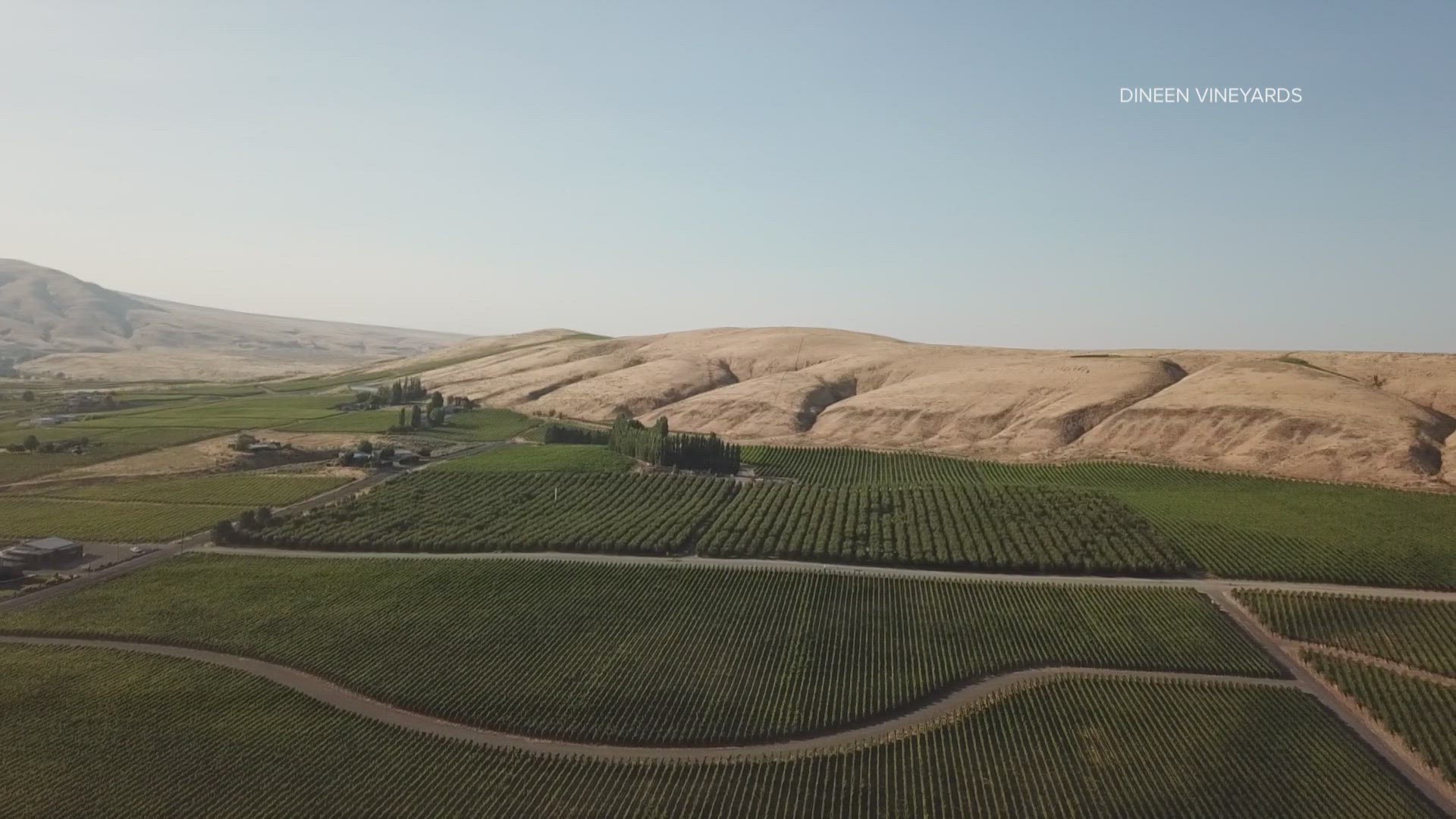ZILLAH, Wash — By the end of 2023 - about a third of Washington state's acres of wine grapes will be certified by Sustainable WA.
The new certification means a new logo with a big meaning on every bottle of wine made from Sustainable WA Certified wine grapes.
It's a group partnership including the Washington Winegrowers Association, Washington Wine Commission, Washington Wine Industry Foundation, and Washington Wine Institute.
Second-generation-owned Dineen Vineyards joined a new generation earning its Sustainable WA certification.
The Sustainable WA Certified logo can only be used by growers with vineyards that have been certified, or by wineries with a valid chain-of-custody certification. The logo can be used on wine labels when wine contains at least 75% certified sustainable grapes.
Dineen Vineyards grows 12 varieties and spans just about 100 acres of the Yakima Valley tucked in the Rattlesnake Hills.
"We do almost everything by hand, and so we really focus on producing quality grapes," said Marissa Dineen, vineyard owner and vintner.
Dineen said, "sustainability is a journey not a destination," and that Dineen has been implementing sustainable practices for several years.
The certification is not only important to Dineen and dozens of other vineyards so far - Marissa said it's important to wine lovers.
"They cannot only know the grapes are wonderful, but they can feel good about drinking the wine at the same time," Dineen said.
The Washington Winegrowers Association agreed wine consumers are focused on looking at where their products are grown and who grows them.
Earning the certification
Becoming a Sustainable WA Certified winegrower includes a self-audit and a third-party audit.
The vineyard Sustainable WA Winegrape Standard is adapted from Vinewise and consists of nine chapters and 83 requirements.
Of the total, 79 are requirements with response categories scaling from one, the lowest ranking, to four, the highest ranking, and four requirements are quantitative metrics.
The chapters include business practices and risk management, viticulture, vineyard establishment and acquisition, water management, soil management, pest management, materials handling, whole farm ecosystem and community, and human resources.
Beyond Washington state
According to Vicky Scharlau, the executive director for Washington Winegrowers, Washington state has been growing exceptional wine grapes for high-quality wine for several decades and this new certification defines the state's presence in the industry even further.
"On an international platform, we can really show the world that not only do we grow great grapes to make great wine, but we can do that sustainably and have been," Scharlau said. "Our growers really felt in today's climate and the marketplace, we really can't just say, 'well, we're sustainable." There has to be some third-party objective process that we go through to confirm that from their perspective, a grower is in fact, sustainable."
The partners behind Sustainable WA said with all sustainable practices - the standards will evolve.
This year marks the first year Sustainable WA-certified grapes have been used to make wine that's now bottled and on the market.
Scharlau said six vineyards were part of the beta testers for the program last year with another 20 vineyards undergoing the process by the end of 2022. Almost all were certified, according to Scharlau.
This year - another dozen vineyards are currently going through the process.
Sustainability in action
Among the list of sustainable practices at Dineen Vineyards, Dineen said her family was thoughtful on the acres it chose to grow its wine grapes. After that, the vineyard has focused on nurturing its ecosystem.
To combat pests in a natural way - Dineen crews release lacewings so the larva will eat mealybugs. Mealybugs can spread leafroll virus — preventing grapes from ripening.
To track grape hydration, Dineen Vineyards uses water meters and some high-flying technology.
“A drone flyover with infrared that looks at the plants themselves and says, are we stressing them too much or are we overwatering them?” Dineen said.
With the results of wine rooted in the ground the grapes are grown, Dineen said it's important to the family's vineyard to stay focused on its sustainability journey.
"Wine is very linked to where it’s grown," Dineen said. "The French have a word 'terroir.' It literally means the ecosystem where it’s grown and made."
Sustainable WA certificates as of Aug. 23:
- Rocky Pond - Orondo, WA
- Angiolina -Zillah, WA
- Dineen - Zillah, WA
- Goose Ridge - Benton City, WA
- North Slope - Walla Walla, WA
- Rawn Farms - Zillah, WA
- Elerding - Prosser, WA
- English Estate - Vancouver, WA
- Kiona - Benton City, WA
- Merkle - Mattawa, WA
- Sagemoor - Pasco, WA
- Shaw - Benton City, WA
- SMWE - Patterson, WA
- Col Solare - Benton City, WA
- Northstar - Walla Walla, WA
- The Ancora Estate Benton City, WA
- Zirkle - Mattawa, WA

